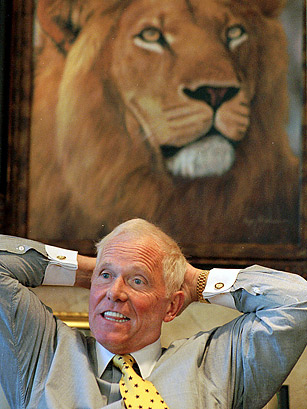
For an executive, the game is all about deftly managing a workforce composed of actual human beings while meeting the demands of the bottom line. The greatest of bosses can even become your friend as they bring smiles to shareholders' faces. On the other end of the spectrum are leaders like Al Dunlap, also known as the Chainsaw. Now retired, Dunlap spent his career hopping from one corporate boardroom to the next, applying a myopic obsession with his companies' financials at the expense of absolutely everything else. During his stint atop Scott Paper, a tenure that began in 1994, Dunlap engineered a corporate restructuring that put 35% of the workforce (or 11,000 people) out of a job. The move simultaneously brought a rise in share value of 225%, and resulted in Kimberly-Clark buying out Scott Paper the year after Dunlap took the helm.
Capitalizing on his own fame, Dunlap wrote a best-selling manifesto titled Mean Business. But making a career out of business brutality would prove his undoing. An ensuing stint at Sunbeam imploded when Dunlap was confronted in a 1998 investors' meeting over his strategy of moving up sales dates for consumer goods like outdoor cooking grills well ahead of delivery in order to advance quarterly sales statistics. After the investors' meeting, at which 200 Wall Street honchos were in attendance, Dunlap accosted one of his skeptics, placing his hand over an employee's mouth and, according to a report by the magazine then known as Businessweek, yelled into his ear, "You son of a bitch. If you want to come after me, I'll come after you twice as hard." Dunlap's financial craftiness was widely viewed to have crossed the lines of accounting norms, and he was let go later that year. Sunbeam could never shake the taint caused by Dunlap and filed for bankruptcy in 2001.